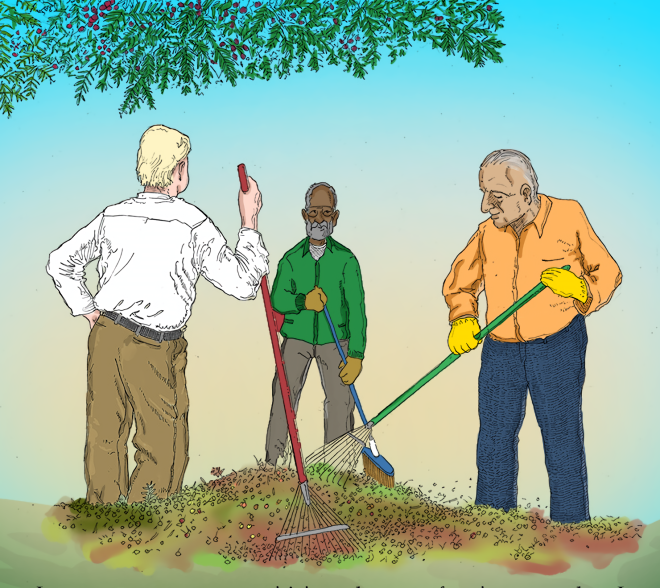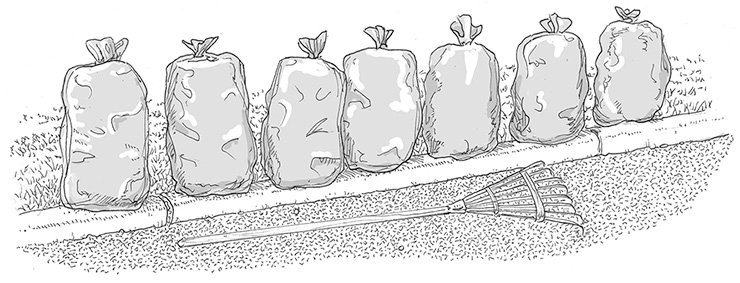Read by Michael Flamel
I am 68 years old. You could say that I’ve been around. Yet not too long ago, I did something I’ve never done before. I raked the street.
Mind you, I did not get up that morning, saying to myself, ‘Gosh, wouldn’t it be fun to rake the street?’ but after looking out my kitchen window at the conglomeration of leaves, branches, and assorted foliage from our last storm, I decided something had to be done.
The primary culprit of the mess out front was a chinaberry tree which, as I soon learned from an internet search, should never be planted near a house, sidewalk, or driveway—precisely where someone had decided to plant it when my house was built in 1921.
Guess the internet wasn’t around back then.
Further research revealed that the chinaberry tree is of the mahogany family and is known as “the pride of India,” where, presumably, folks have learned not to plant it next to their homes. When mature, they can grow to 50 feet in height. Mine is easily 70 feet and probably more. They produce a drupe as opposed to a berry which, as the internet informed me, has something to do with having a boney endocarp. As I write this, it makes absolutely no sense to me, as I am clearly not a botanist and wouldn’t know an endocarp from my elbow. I only know that the tree had littered the byways around my house with yellow, marble-sized seed pods, berries or drupes (take your pick) that were hard, so incredibly hard that they would, given enough of them, provide a very credible heat shield on space capsules.
Undaunted, I donned my favorite pair of gardening jeans, the holey ones my wife has been trying to discard for the last two years, and assembled the accoutrements for addressing the tree-borne catastrophe out front: rake, garbage can, broom, work gloves. I was all set.

It was a toss-up as to which tool to use for the street, but I quickly settled on the rake, rationalizing my choice as being the more manly way to address the unruly mess. I had worked but a few minutes when a gentleman passed by, carrying a large plastic bag of aluminum cans. I had seen him before but had never spoken to him, assuming he was one of the homeless people that frequented the alleys in our neighborhood, collecting cans, bottles, and such.
“Yo, quite a mess you’ve got there,” he acknowledged, stating the obvious. “If you’d like some help, I could grab my rake. I live just around the corner.”
He told me his name was Dimitri. He had lived in the neighborhood most of his life and the money he collected from aluminum cans went to a no-kill animal shelter
And just like that, there were two of us raking the street.
We made quick work of the street and moved on to the sidewalk and driveway. The chinaberry tree reclamation project was proceeding nicely.
And then Dale, my 83-year-old neighbor from across the street, a guy I had spoken to only once or twice before, shuffled over, carefully circumnavigating the piles of sticks and leaves.
“Morning, gents. Quite a project you got going there. Could you use another hand?”
Dimitri and I stopped, looked at one another, then looked at Dale. He was hunched over. Clearly fragile. And feeble.
“I’m pretty handy with a broom,” he announced, smiling broadly.
“Glad to have you along for the ride, Dale,” I remarked cheerfully
And just like that, there were three of us.
The morning spent, we worked into the afternoon. Like ancient ruins emerging from the shifting sands, the street, sidewalk, and driveway slowly reappeared.
We laughed, joked, and ribbed each other. (“Say, Dale, think you could shimmy your 83-year-old scrawny tush up the chinaberry tree and cut off that dead branch?”) We told stories about the neighborhood, some true, some fabrications. We bonded together as folks do when work is shared, bringing lightness and levity to the task at hand.
I loved every minute of it.
The completion of our enterprise came as a surprise. One moment we were laboring together, side by side and then suddenly, we weren’t. Lopsided black, bulging garbage bags dotted the horizon of our efforts like Easter Island statues. We surveyed our handiwork, and I felt a kind of sadness that our time together had come to an end.
There were high fives with promises to stay in touch and, perhaps, recapture some of the camaraderie we had just shared. But, of course, promises of that kind are often sentimental expressions of the moment. And in subsequent weeks, while I often saw Dimitri and Dale, our paths intersected only for the occasional smile or friendly wave.
And then, a few months later … I felt it before I saw it. A drupe or berry (your choice) struck me on the noggin. A quick surveillance of the chinaberry tree confirmed my worst suspicions. With the next surge of California Santa Ana winds, the street, sidewalk, and driveway would be blanketed with chinaberry droppings.
But then I fondly recalled what had happened the last time and knew that once I took a rake in hand, my neighbors, now my friends, Dimitri and Dale, would show up and offer their able assistance. We would face the onslaught together. And who knows? Maybe others would join us as well.
As a breeze began to stir, I gazed upwards and smiled. “OK, chinaberry tree,” I whispered. “Bring it on.” ❖



 Previous
Previous


I had to go to the internet to discover what a Chinaberry tree looks like. There was no mention of it’s beautiful flowers. They remind me of orchids. So pretty. I guess they also grow in Australia? I haven’t heard.
They do grow in Australia!
This is a lovely story that I once read in your printed magazine. I’m happy to read it again this morning. I planted a row of 4 Chinaberry trees along my front driveway and they are gorgeous and never cause problems. The one in the back yard finally came down in a storm but it gave tons of hard pods that many here use for making jewelry. Too bad I didn’t realize this until it was too late, maybe I could have sold a black garbage bag ful lof ’em every year!
A very enjoyable tale. Thank you.
well written, engrossing, heart-lifting. thank you